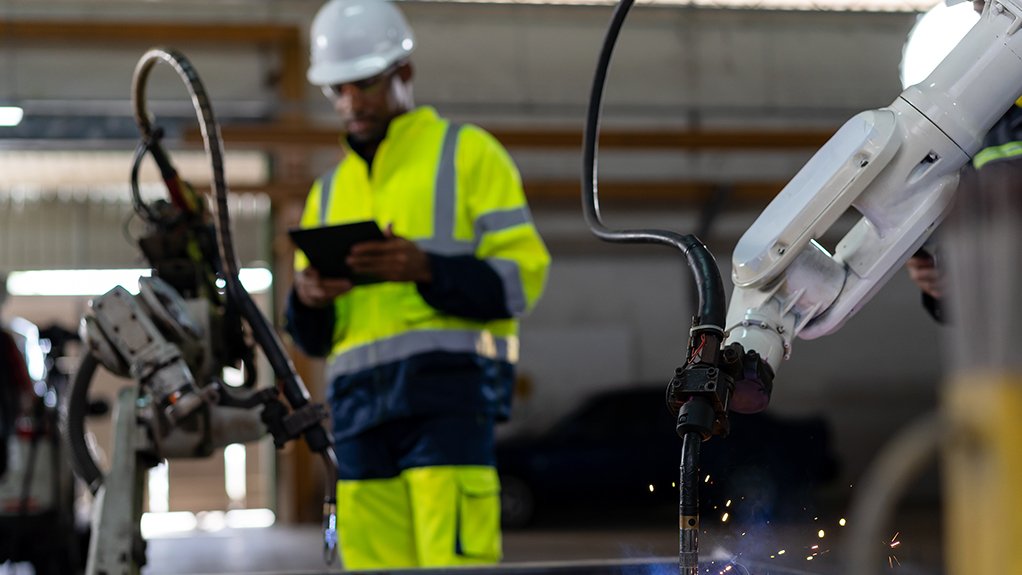South Africa needs to embrace more 4IR technology or fall behind
Professional services and auditing firm PwC says that South Africa’s competitors are all adopting 4IR technologies and developing their workforces and, if South Africa fails to follow suit, the country’s industrial manufacturing sector will continue to fall behind and deindustrialise.
The firm recommends that industry leaders invest in strategies which are more technology and sustainability focused to create a culture that will help them stay relevant, attract and retain employees, improve productivity and make an impact, both inside and outside of the workplace.
PwC believes South Africa has positioned itself as a prime manufacturing hub on the African continent, with its industrial manufacturing industry serving as a crucial multiplier of economic growth, an engine of development and a significant contributor to the country’s gross domestic product (GDP).
In 2022, the sector contributed 11.4%, or R3-trillion, towards the country’s GDP. Today, about 1.5-million people work in industrial manufacturing, and are witnessing progression at a rapid pace within the sector.
“New technologies are changing the face of manufacturing. Factories are becoming increasingly connected, as machines talk to one another and to humans, and automation reaches new milestones with robots becoming more independent.
“This has understandably left groups of employees jittery over the Fourth Industrial Revolution’s (4IR’s) impact on job security and changing roles,” PwC South Africa smart manufacturing lead Vinesh Maharaj says.
Maharaj explains that disruptions within the sector are causing business leaders to pivot owing to the rapid innovation of new digital technologies such as the Internet of Things, artificial intelligence and machine learning.
“We are also seeing that what is being manufactured and how it is produced is also changing. For example, in the automotive manufacturing industry, there is a global shift to hybrid and eco-friendly vehicles,” he says.
Given the pace at which the industrial and technological evolution is progressing, PwC believes it is pertinent for business leaders to consider their impact on the future of work and what it means for the workforce.
“Sustainability considerations are increasingly important, as companies seek to reduce their environmental footprint and improve their social impact. Developing green skills among employees is crucial to achieving these goals and creating a sustainable future,” PwC Africa workforce of the future platform leader Marthle du Plessis says.
She believes the global industrial manufacturing sector understands the importance of upskilling employees in terms of “green” skills. However, she notes that South Africa has a way to go, with only 24% of the sector seeing it as important and with less confidence than other skillsets.
PwC’s latest 'Global CEO Survey' highlights that investors are more likely to invest in companies that efficiently manage sustainability risks and opportunities, with 79% agreeing that the consideration of sustainability risks and opportunities is a significant factor in their investment decision-making, Maharaj explains.
“Therefore, sustainability is essential not only from an impact point of view, but also in attracting investors,” he says.
Maharaj adds that sustainability should be of crucial importance to local business leaders, as South Africa’s relative passivity in decarbonisation efforts makes it the most carbon-intensive country within the Group of 20.
“The case for change is real, and industrial manufacturing companies need to relook at their sustainability strategies and establish how to enable their workforce to execute them,” he says.
He notes four ways this can be done, adding that it is important to bear in mind the buy-in that is needed at all levels of an organisation, as well as the realignment of the entire workforce.
In PwC’s latest thought leadership article “Building avenues for tomorrow’s industrial manufacturing workforce”, the company notes that the 4IR comes with a wealth of technology that brings opportunities for production cost reduction, productivity and earnings improvement, and the development and introduction of new business lines. Despite this, about 72% of South African workers have said they are concerned that automation is threatening their jobs.
“While it is expected that there will be a decline of repetitive tasks for assembly and factory workers, material handlers and many other roles, the decline will be counterbalanced by an increase in new, often formal, wage jobs being created, especially in the service sectors, and at a faster rate. It will also result in earnings improvements in the informal sector,” Maharaj says.
This is supported by a 2023 World Economic Forum report which asserts that technology adoption will remain a key driver of business transformation in the next five years.
“By creating a digital transformation journey through the use of a variety of applications and technologies, this will empower, retain and attract the workforce. The effective implementation of this is likely to increase efficiency, decrease cost, improve customer experience and facilitate a company’s growth,” Du Plessis says.
She emphasises that negatively impacted staff need to be given the first opportunity to be trained into occupying the new jobs created.
“This will require three- to five-year planning horizons through a robust strategic workforce planning strategy,” she notes.
Comments
Press Office
Announcements
What's On
Subscribe to improve your user experience...
Option 1 (equivalent of R125 a month):
Receive a weekly copy of Creamer Media's Engineering News & Mining Weekly magazine
(print copy for those in South Africa and e-magazine for those outside of South Africa)
Receive daily email newsletters
Access to full search results
Access archive of magazine back copies
Access to Projects in Progress
Access to ONE Research Report of your choice in PDF format
Option 2 (equivalent of R375 a month):
All benefits from Option 1
PLUS
Access to Creamer Media's Research Channel Africa for ALL Research Reports, in PDF format, on various industrial and mining sectors
including Electricity; Water; Energy Transition; Hydrogen; Roads, Rail and Ports; Coal; Gold; Platinum; Battery Metals; etc.
Already a subscriber?
Forgotten your password?
Receive weekly copy of Creamer Media's Engineering News & Mining Weekly magazine (print copy for those in South Africa and e-magazine for those outside of South Africa)
➕
Recieve daily email newsletters
➕
Access to full search results
➕
Access archive of magazine back copies
➕
Access to Projects in Progress
➕
Access to ONE Research Report of your choice in PDF format
RESEARCH CHANNEL AFRICA
R4500 (equivalent of R375 a month)
SUBSCRIBEAll benefits from Option 1
➕
Access to Creamer Media's Research Channel Africa for ALL Research Reports on various industrial and mining sectors, in PDF format, including on:
Electricity
➕
Water
➕
Energy Transition
➕
Hydrogen
➕
Roads, Rail and Ports
➕
Coal
➕
Gold
➕
Platinum
➕
Battery Metals
➕
etc.
Receive all benefits from Option 1 or Option 2 delivered to numerous people at your company
➕
Multiple User names and Passwords for simultaneous log-ins
➕
Intranet integration access to all in your organisation




















